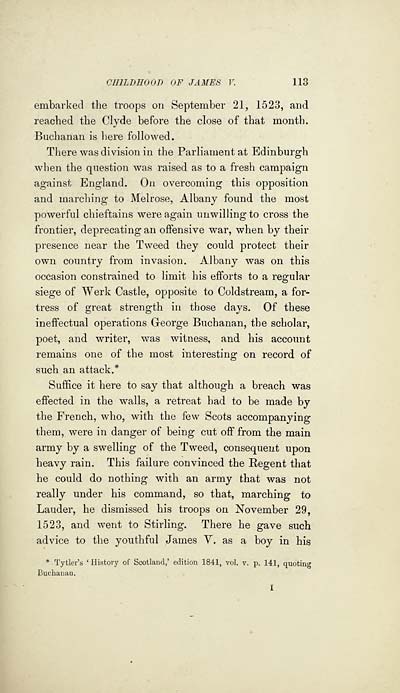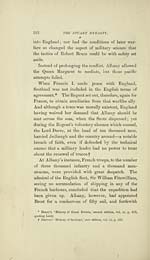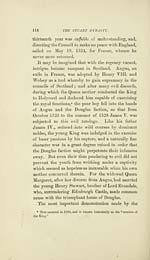Stuart dynasty
(151) Page 113
Download files
Complete book:
Individual page:
Thumbnail gallery: Grid view | List view

CHILDHOOD OF JAMES V. 113
embarked the troops on September 21, 1523, and
reached the Clyde before the close of that inontb.
Buchanan is here followed.
There was division in the Parliament at Edinburgh
when the question was raised as to a fresh campaign
against England. On overcoming this opposition
and marching to Melrose, Albany found the most
powerful chieftains were again unwilling to cross the
frontier, deprecating an offensive war, when by their
presence near the Tweed they could protect their
own country from invasion. Albany was on this
occasion constrained to limit his efforts to a regular
siege of Werk Castle, opposite to Coldstream, a for-
tress of great strength in those days. Of these
ineffectual operations GTeorge Buchanan, the scholar,
poet, and writer, was witness, and his account
remains one of the most interesting on record of
such an attack.*
Suffice it here to say that although a breach was
effected in the walls, a retreat had to be made by
the French, who, with the few Scots accompanying
them, were in danger of being cut off from the main
army by a swelling of the Tweed, consequent upon
heavy rain. This failure convinced the Regent that
he could do nothing with an army that was not
really under his command, so that, marching to
Lauder, he dismissed his troops on November 29,
1523, and went to Stirling. There he gave such
advice to the youthful James V. as a boy in his
* Tytler's ' History of Scotland,' edition 1841, vol. v. p. 141, quotin"
Buchanau.
embarked the troops on September 21, 1523, and
reached the Clyde before the close of that inontb.
Buchanan is here followed.
There was division in the Parliament at Edinburgh
when the question was raised as to a fresh campaign
against England. On overcoming this opposition
and marching to Melrose, Albany found the most
powerful chieftains were again unwilling to cross the
frontier, deprecating an offensive war, when by their
presence near the Tweed they could protect their
own country from invasion. Albany was on this
occasion constrained to limit his efforts to a regular
siege of Werk Castle, opposite to Coldstream, a for-
tress of great strength in those days. Of these
ineffectual operations GTeorge Buchanan, the scholar,
poet, and writer, was witness, and his account
remains one of the most interesting on record of
such an attack.*
Suffice it here to say that although a breach was
effected in the walls, a retreat had to be made by
the French, who, with the few Scots accompanying
them, were in danger of being cut off from the main
army by a swelling of the Tweed, consequent upon
heavy rain. This failure convinced the Regent that
he could do nothing with an army that was not
really under his command, so that, marching to
Lauder, he dismissed his troops on November 29,
1523, and went to Stirling. There he gave such
advice to the youthful James V. as a boy in his
* Tytler's ' History of Scotland,' edition 1841, vol. v. p. 141, quotin"
Buchanau.
Set display mode to:
![]() Universal Viewer |
Universal Viewer | ![]() Mirador |
Large image | Transcription
Mirador |
Large image | Transcription
Images and transcriptions on this page, including medium image downloads, may be used under the Creative Commons Attribution 4.0 International Licence unless otherwise stated. ![]()
| Histories of Scottish families > Stuart dynasty > (151) Page 113 |
|---|
| Permanent URL | https://digital.nls.uk/94766711 |
|---|
| Description | A selection of almost 400 printed items relating to the history of Scottish families, mostly dating from the 19th and early 20th centuries. Includes memoirs, genealogies and clan histories, with a few produced by emigrant families. The earliest family history goes back to AD 916. |
|---|

